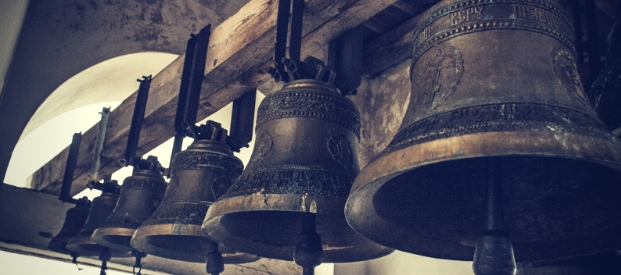Armistice Day: Bells Ring Out One Hundred Years on
At the end of the First World War, church bells across the land rang out in jubilant celebration. This Sunday 11th November, in cities, towns and villages, bells will once again ring for peace, beginning with a slow toll in memory of those who died, and then ringing the changes to produce the joyful peal that is such a distinctively British sound.
1,400 bell ringers lost their lives in the war. In their memory, on 11 November 2018, 1,400 newly-recruited ringers will take part alongside experienced ringers in churches throughout the British Isles. As well as the country-wide peal of bells, we remember the end of the war with a two minute silence and the traditional Remembrance Day ceremony in Whitehall when members of the Royal Family and others will lay wreaths at the Cenotaph. In addition, on this anniversary year, the ceremony will include the People’s Procession with 10,000 members of the public marching past the grave of the Unknown Soldier.
At the same time other ceremonies will take place at many of Britain’s War Memorials. There will be special events: plays, concerts, films, talks and performances, and the day will end with remembrance services at Westminster Abbey in London and in Glasgow, Cardiff and Belfast, giving thanks for peace and those who returned from the Great War.
Memories from 100 years ago
When the bells rang out for peace 100 years ago, what was it really like for those who lived through the war years? We see Armistice Day pictures of happy, smiling people thronging the streets and waving flags. But of course, although there was great relief that the war was over, it was also a time of exhaustion and of great sadness at the loss of loved ones. We know that the peacetime which followed was a time of hardship, unemployment and recession and that many were taken ill and died in the influenza epidemic of 1918 and 1919.
The Imperial War Museum has collected a vast archive of people’s memories of the time. In these excerpts, four individuals describe what the armistice and peacetime meant to them.
Masie Nightingale worked at a factory in Southampton and took part in the celebrations in the city. She said: ‘We went round in lorries, didn’t we, with little flags. We all went round in the lorries, all round everywhere, singing and laughing and had a jolly good time. We were in work but as soon as the armistice was out, everybody came out. Men, all the workmen and all, didn’t matter who it was, all cluttered up in the lorries and we went round in our overalls and our mob caps and all over the town. Yes, it was a wonderful day, I can remember that.’
Basil Farrer served on the Western Front during the war. He was in Nottingham on 11 November 1918 but didn’t join the crowds in the city that day. He said: ‘I remember Armistice Day and I didn’t know at the time but in every city, everybody went mad. In London, they were dancing in the streets, the crowds, in all the cities, in Paris and in Nottingham too. In Market Square, it was one mass of people dancing and singing. I did not go there. I do remember – for some reason or other – inexplicable, especially in so young a chap as myself, I felt sad. I did – I had a feeling of sadness. And I did remember all those chaps who’d never come back, because there was quite a lot, nearly a million – not quite a million.’
In France, Clifford Lane was too physically and mentally shattered to celebrate. He said: ‘… as far as the armistice itself was concerned, it was an anti-climax. We were too far gone, too exhausted, really to enjoy it. All we could do was just go back to our billets; there was no cheering, no singing, we had no alcohol – that particular day we had no alcohol at all – and we simply celebrated the armistice in silence and thankfulness that it was all over. And I believe that happened quite a lot in France. There was such a sense of anti-climax; there was such a … We were drained of all emotion really – that’s what it amounted to, you see. Then it was a question of when we were going to get home …’
The men returned to a country that had changed a great deal since war broke out in 1914.
Unemployment affected millions of people. William Kirk, one of many disillusioned ex-servicemen remembers: ‘I was very dissatisfied when I came home, conditions I found. We were promised lands for heroes to live in and all that sort of thing, but when we came home, we found nothing. Everybody, everybody, wanted us – king and country wanted us – in 1914 and when we come back nobody wanted us. Because there was neither work nor money. There was poverty everywhere, everywhere … People were jolly hard up.’
Bell ringers remembered
The sleepy Wiltshire village of Edington was hard hit by the war. Of the 1,400 bell ringers who died, six of them were ringers at Edington Priory Church. They were all at the heart of the working community: one was a carer in a local hospital, four were farmers and one was the village wheelwright. Four played in the local football team. Now five of them are buried along the Western Front, but the hospital worker, Private Leonard Drewett, died during hospital treatment in Colchester and was brought back to be buried in the churchyard at Edington. The loss of these six good men must have had a devastating impact on the village.
Reference for the WW1 memories: www.iwm.org.uk/history/voices-of-the-first-world-war-armistice










